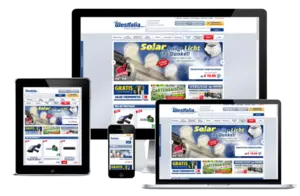Operation and further development of the Westfalia online shop
Initial digitization of the Westfalia Werkzeugcompany's business processes and continuous further development of the online store
At the beginning of the cooperation with Westfalia in 2002, the aim was to convert the already existing, complex, analog processes of Westfalia into digital form and, at the same time, to accustom the regular customers acquired offline to the online store. The layout and the general look & feel of the Westfalia online store were therefore largely based on the familiar catalog design in order to create a smooth transition between offline and online presence.
In more than 20 years of cooperation, Westfalia and Marketing Factory can look back on a large number of successful sub-projects: Since the initial digitization of the processes, the online store has been continuously developed and adapted to new requirements of the digital world. Since then, the online store has undergone a series of (soft) relaunches, has been optimized for mobile devices, and has been connected to a PIM system.

| Client | Westfalia Werkzeugcompany GmbH & Co. KG |
|---|---|
Project duration | 2002–2023 |
Discover the project from the perspective of:
Shop Technologies
The Westfalia online store was individually developed by MFC and tailored directly to the customer's needs. MFC created a direct interface to Westfalia's merchandise management system and, in a later follow-up project, supported Westfalia in selecting a suitable PIM system. MFC also connected various payment options from a wide range of payment providers such as PayOne and PayPal or AmazonPay to the Westfalia online store and also integrated a number of multi-level payment options (installment payment) for customers.
Shop Technologies
The existing processes of the merchandise management system (formerly AS400, now System i) were connected to the store through an individual development. Interfaces were used not only to connect data streams such as articles, orders and customers, but also to deliver statistical data to the BI systems. In addition, the store provides web services that are queried directly by merchandise management and included in the order processing process. Dynamic data from merchandise management is provided live via a web service and evaluated directly by the store. The store also serves as a data provider for various external partners and offers built-in tracking and evaluation systems for partner sales.
CMS Technologies
Content maintenance for supplementary content for the products is carried out in the TYPO3 content management system, which was seamlessly linked to the store system. Currently, TYPO3 version 7.6 ELTS is being used. In addition to the standard content elements, Marketing Factory has developed a number of individual elements that are specifically tailored to the needs of the customer.
CMS Technologies
The shop's product data is seamlessly integrated into the CMS, so that editors have direct access to the products or categories and can use them editorially as elements in the landing pages or in the shop home pages. Changes to product data are automatically applied to the pages. Editors also have the option of linking directly to product and category pages. Changes to the link structure are also applied automatically. The necessary synchronization of data between TYPO3 and the store system was implemented as a direct interface.
Faceted Shop Search
A good, high-performance search is one of the most important features in an online shop. FactFinder was therefore integrated into the Westfalia online shop for the most efficient, sales-increasing product search, including similarity search. In FACT-Finder, Westfalia employees can, among other things, create search campaigns for specific articles, store thesaurus entries, and view daily statistics on shop searches.
Search technologies used
FACT-Finder is used as the search system for the product data as an on-premise solution. The necessary product data is generated directly from the shop system and imported into the search index. The necessary information for displaying the products in the search results is in turn dynamically fed from the shop system to ensure uniformity of display. FACT-Finder itself is operated redundantly on several systems for optimal availability.
Hosting and Monitoring
The Westfalia systems are hosted in our own infrastructure within our Düsseldorf data center. To enable an uptime of more than 99.97%, the systems were set up with double redundancy, so that in the event of a malfunction, one of the systems can always guarantee the maintenance of the running shop. A CDN is also used to improve content delivery.
Hosting and Monitoring
The hosting is based on the kvm-based management software ganeti, which enables redundant operation of the individual cluster nodes. The nodes are installed in different fire compartments of the data center, so that even in case of technical failures, the operation of the systems can still be guaranteed. For security reasons, the instances are divided into different network segments. DDoS protection also protects the computer systems.
Connection to newsletter system
Every online shop usually includes a newsletter system. In the case of Westfalia, this is optimizely. In addition to the classic transfer of information about newsletter subscribers, the shop also dynamically queries this information from optimizely in order to personalize the content of landing pages for end customers.
Integration of prudsys RDE
Marketing Factory implemented an interface to the prudsys Recommendation Engine (RDE) for dynamic selection of product recommendations. The engine evaluates customer behavior in real time and works with personalized recommendations and incentives to increase customer value. In the process, information about the user is dynamically transmitted to Prudsys during the visit and enriched in a DSGVO-compliant manner.
